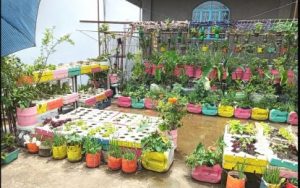
FREE SEEDS. The Department of Agriculture in the Cordillera Administrative Region is urging residents in urban areas to engage in backyard or survival gardening to provide nutritious and fresh vegetables for their families that can even be sold in an urban setting much like in this 2020 photo of a rooftop garden in Baguio City. The department has launched the Green Revolution 2.0 program that aims to encourage residents to adopt the urban gardening technologies with available free seeds at the DA offices. (PNA photo from the FB of PIO-Baguio)
BAGUIO CITY – The Department of Agriculture in the Cordillera Administrative Region (DA-CAR) is urging residents in the region to avail of free seeds to grow their own food at home as it launched a program promoting the planting of vegetables using the peri-urban agriculture system.
In an interview on Monday, DA-CAR regional director Dr. Cameron Odsey said the “Green Revolution 2.0” program is in line with the agency’s thrust to boost food production by involving residents in cities and urban areas in the region in the food production initiatives.
“Gusto natin na sana ma-involve ang residente sa pagtatanim ng pagkain gamit ang maliliit na lugar sa bahay nila kasi may mga pagkaing tanim naman na pwedeng tumubo at mamunga kahit nasa paso sila (we want the residents to be involved in food production using their small spaces because there is food that can be grown in pots and they bear fruits),” he said.
Odsey said the adoption of the program will not only mean food availability but also a cost-cutting measure considering the prices of commodities.
The Green Revolution 2.0 is attuned with the new DA program, known as the National Urban and Peri-Urban Program (NUPAP) which will be implemented under the High-Value Crops and Development Program (HVCDP).
NUPAP is an initiative of the DA that seeks to improve the nutrition of Filipinos by intensifying the production and supply of fresh fruits and vegetables in urban, peri-urban, and rural areas, turning communities into patches of green edible landscapes by establishing vegetable gardens.
Odsey also encouraged growing additional crops, such as herbs and spices.
